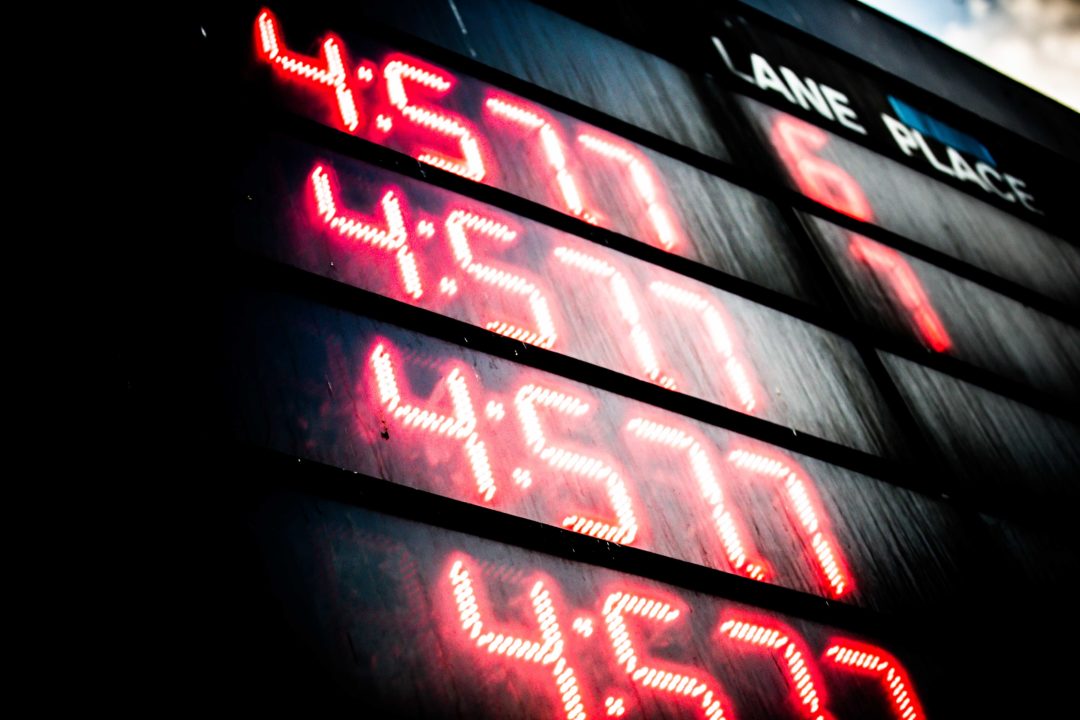Courtesy: Bella Postel
When I look back on my 10 years of competitive swimming, I remember it very differently than I thought I would.
I started as a six-year-old age-grouper, so I was really tiny compared to my teammates. My lips turned blue as I shivered on the side of the pool and watched my older friends compete in events like the 200 fly and the 500 free.
I always looked up to the big kids. I watched them swim fly sets in senior group, wondering how and if I could ever get there. I loved to cheer them on in their races and feel like a friend of theirs. All the while, I was a budding backstroker with my eye on the prize: a state cut in the 10 & under 100-meter backstroke.
As I improved and attended more practices, I became increasingly time-focused. Having a goal unearthed a competitive side of me that I was unfamiliar with. I distinctly remember feeling confident that in one meet weekend, I was going to drop six seconds in my 100 back and secure the cut I’d been wanting. And when that race came, I kicked hard, put my head back, and got it.
This was only the first of a number of victories I’d come to feel proud of as an age group swimmer. I ended up getting the team record in the 8 & under 100-yard backstroke. After that, I fought for two more team records: the 8 & under 400-meter freestyle and the 10 & under 200-yard backstroke. I worked my way up to become one of the top 10 & under girls in the state of Georgia, and eventually, I won third in the 10 & under 400-meter freestyle at the Georgia Age Group State Championships.
I became emotionally attached to experiencing wins. I liked seeing the faces of my parents and my coaches after I dropped time or achieved a goal. It kept me going, more so than my love for the sport at the time.
When I got a bit older, around 11 years old, I started adding time. Not just in one meet, but in almost every meet. I had graduated from an era filled with triumph into one filled with tears; I was no longer a tiny six-year-old that could drop seven seconds in a 100 each time I swam it. I was not prepared to lose. And when I lost, I lost big.
I would cry after most races because all I was worried about was the clock. I wondered, “Why am I not getting better? Am I not trying hard enough? Why am I not seeing the results that I used to? Am I just not good anymore?”
“You’re in the woods right now,” a coach told me. All I needed to do was make it through to the clearing.
And I did. Eventually. After lots of mixed feelings and races I was disappointed in, I slowly made it out of the rut I’d fallen into. At 15, I reached a place where I could feel proud of myself. Though I wasn’t third in Georgia in the 400-meter freestyle, I was making gains in the 200 back, and I was proud of it.
As I look back on my swimming career at 16 years old, I hardly remember a single time I saw up on that scoreboard. Yes, there were stand-out races that I can recall and smile about, but I can’t remember the vast majority of them. Not even the ones that made me cry or the ones that made me hang my head in disappointment on the car ride home.
What I really remember are the laughs. The hugs. The shared experiences. The time my teammates and I danced behind the blocks before finals to a walk-out song. The purple marks our skin-tight tech suits would leave on us. The adrenaline that would pulse through my blood before I dove in for a 500. The yelps and screams of my friends that I would hear right before I flipped. The feeling of finding a comfortable rhythm in a distance set. How kind and understanding my coach was. The time he told me I was one of the hardest workers he’s ever met. The feeling of wanting to impress the world when I was in that pool.
I thought that after 10 years of swimming, I would have a load of accomplishments to show off and a set of times that I’d be proud of. Instead, I have the fruits of a journey, one that forced me to grow, get out of my comfort zone, and push harder than I ever thought possible. I am left with a set of tools in my back pocket, which is bursting at the seams with invaluable memories and lessons I’ve learned both in and out of the pool.
Most importantly, I’m left with lifelong friendships built on the times we shared. After all, the times that you remember aren’t the ones you see on the scoreboard.
 ABOUT BELLA POSTEL
ABOUT BELLA POSTEL
Bella Postel is a competitive swimmer and former member of Chattahoochee Gold Swimming. She is now co-captain of her high school swim team. Her favorite event is the 200 back.


Well said. Stay blessed!
Jack Spitser would like you to remember 4:57.7
There’s one time on the scoreboard I can’t ever forget, but that’s because I went 15:59.99 in the 1650 in my last race.
So true! Great article!